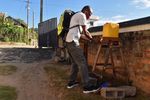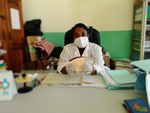COVID-19 SEED Madagascar: Adaptation and development in response to
←
→
Page content transcription
If your browser does not render page correctly, please read the page content below
SEED Madagascar: Adaptation and development in response to
COVID-19
Date of update: 6th November 2020
Introduction
As in the rest of the world, COVID-19 has posed significant challenges to SEED over the past seven
months. March and April saw the evacuation of the vast majority of International staff and between
April and July working hours in Madagascar were severely restricted with the offices unable to open
or working half days for weeks at a time. This resulted in the continual adaptation of protocols to
cope with the developing situation, and in May, risk assessments were introduced for all bush based
work as a result of travel restrictions, bans on gatherings and a need to keep both staff and
communities safe from the possibility of COVID-19 transmission. With COVID-19 cases more
prevalent in Antananarivo, our staff in the capital mixed working from home and shorter days during
the weeks when the office could open at all. SEED also introduced a range of measures to safeguard
staff including building contactless handwashing stations, providing masks, soap and hand sanitiser
and temperature checks at the gate of the office.
Our work in country has faced additional challenges with a slow reduction in the capacity of the
international staff with many people having to find part time, or full-time work, to supplement basic
stipends only ever meant for living in Madagascar. We are currently working with only 64% of the
capacity of international staff that we had in early April. Despite staff being spread over 6 countries
and the resulting time zone differences of up to 17 hours, teams are working flexibly to ensure
meetings and essential discussions still take place.
In terms of funding, SEED has also seen donors postponing both current and future funding rounds
leaving SEED with gaps in funding for projects now due to start, and having to plan for further gaps
later in the year as traditional summer and autumn funding rounds are delayed.
Adaptations to existing projects
Since March, SEED has planned its response to COVID-19 by framing this in terms of a continuum of
an initial preparation stage before COVID-19 impacted on Madagascar, moving into a mid-term
response stage and finally into a post COVID-19 recovery stage. We knew that none of these stages
would be easy to define in terms of community needs or timings, but that by continually talking with
staff, communities, local authorities and donors, we would be able to move through this continuum
and plan services that best met people’s immediate needs.
SEED began this process in late March through its social media output and an initial redirection of its
Facebook strategy to concentrate on the development and distribution of high quality, clear COVID-
19 prevention messages. Recently, our communications have changed again to focus on providing
information on the situation in country and what SEED is doing to support communities.SEED was immediately able to both adapt current projects and develop new projects in line with the
emerging needs of communities. SEED’s Rural CLTS work funded through UNICEF gave messages on
handwashing to 13,063 people and taught 7,752 people how to build a simple household
handwashing station. Three new projects have targeted support to health centre staff and patients,
particularly mothers with young children. Project co-ordinators and community agents in the
Environment and Sustainable Livelihoods Department have adapted approaches and have given
COVID-19 briefings to more than 2,000 people living in isolated rural areas who have little
opportunity of gaining information outside of SEED.
SEED will continue to adapt its work in the wake of COVID-19. As we have moved into the response
stage, we have continued to grow our support to communities through the fundraising,
development and implementation of a range of specific COVID-19 projects. Over the next year, SEED
will continue to adapt and seek opportunities to support communities within this increasingly
difficult environment.
COVID-19 Preparation and Response Projects
1. Rowan Trust - Complete
Timeframe: 3 months: 1st April – 30th June 2020
This grant was rapidly implemented in the very initial stages of the COVID-19 outbreak in
Madagascar. Over 5,700 masks were made and distributed. Radio messages in national and Anosy
dialects on handwashing, social distancing, avoiding touching your face, and COVID-19 symptoms
were developed and broadcast 160 times. 175 posters in accessible graphics and local language,
covering preventative measures, were distributed to churches, schools, water points, and other key
community hubs. SEED also ran a Malagasy-language social media campaign, publishing clear and
concise public health messages, for example on preventative measures, COVID-19 symptoms and
correct mask usage. SEED provided a total of 51 handwashing stations to Fort Dauphin and the rural
communities of Sainte Luce and Mahatalaky.
2. SEED Mask appeal - Active
Timeframe: Ongoing from 1st May 2020
This grant focusses on mask making and distribution, continues work begun through the Rowan
grant, and includes funding obtained through the ‘Masks for Madagascar’ Appeal, Mask Exchange,
and NEST. This income stream funded masks made by Stitch Ste Luce, as well as masks made by
seamstresses in Fort Dauphin, which were distributed to healthcare facilities, market vendors, and
rural community members in 17 communes.SEED’s new mask exchange went live on the 22nd of June, and has already sold 1,351 masks with a
profit to SEED’s COVID-19 work of £7,278.
3. Funding for maternal and child health activities - Active
Timeframe: Ongoing from 1st June
This funding was donated through a long term donor of SEED’s Maternal and Child Health work and
is focussed on the health clinics in Fort Dauphin. In the clinics, handwashing stations, soap, and
masks have been provided, and information about COVID-19 in relation to maternal health will be
disseminated at vaccination and antenatal visits as well as in each individual households. So far, over
600 women have been supported at these sessions by three COVID-19 trained community health
workers.
4. British Embassy Health Strengthening Grant
Timeframe: August 2020 – March 2021
This funding supports four healthcare facilities in Fort Dauphin and six in surrounding rural
communes, which refer to the hospitals and clinics in town. This grant focusses on training
community health workers to support healthcare facility staff in giving COVID-19 messages and
managing the waiting areas, as well as training healthcare facility staff on cleaning protocols. It will
provide a total of 7000 masks, 20 handwashing stations, and 10 disinfection kits. Key information will
be disseminated through radio messages, TV programmes, posters, and social media posts to
increase community confidence in their local healthcare facilities. It will also focus on maternal and
child health by training community health workers to conduct information sessions with parents to
provide specialised information, taking over the clinic work initially covered by maternal and child
health funding.
5. UNICEF Emergency GrantTimeframe: July – December 2020
In addition to the ongoing Rural CLTS project, SEED has signed a separate partnership agreement
with UNICEF Madagascar for a three-month emergency project (which has since been extended by
two months) to scale-up current COVID-19 prevention measures in 17 of Anosy’s most vulnerable
communes. The project focusses on strengthening the capacity of healthcare workers and
community health workers to raise awareness about preventing transmission of the virus, as well as
enabling public health centres (CSBs) to have the correct policies and resources in place to ensure
patient safety. The funding will be used to establish handwashing points at busy local areas, such as
community marketplaces, and to support disinfection activities at train and bus stations. SEED will
also carry out research activities in the target communities and will undertake healthcare system
assessments in 17 CSBs to gain a better understanding of how COVID-19 is affecting people across
the Anosy region.
6. Pending applications
Compounded by poor seasonal rainfall, the economic effects of the coronavirus pandemic are
predicted to have a significant impact on food security in Anosy. The World Food Programme has
made a call for partners in the south of Madagascar, to which SEED submitted an application in early
July 2020. Such a partnership would include activities such as distributing supplies to immediately
save lives during severe food shortage, building capacity and reinforcing livelihoods to protect
communities against future food supply and malnutrition issues, and building long-term resilience
against food insecurity.
In order to further respond to COVID-19 related food insecurity, SEED submitted a proposal to the
Darwin Initiative in November 2020 for a rapid pilot of insect and crop farming at the household
level, to be conducted in the rural communities of Sainte Luce and Elodrato. Selected for their short
time to harvest and low maintenance, yields would provide short-term relief of food insecurity and
potential for longer-term recovery through alternative livelihoods.
Distribution
Total numbers
Masks Posters & Radio broadcasts Handwashing People attending
flyers stations information sessions
16,321 5,305 965 185 24,877You can also read























































